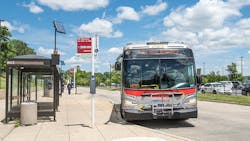WMATA Board targets zero-emission bus fleet by 2045
The Washington Metropolitan Area Transit Authority (WMATA) Board of Directors approved a major change to its Metrobus fleet that supports the region's clean air goals and establishes guidelines for more sustainable business practices.
Reflecting back on the turbulence of the pandemic and the economy, with a concurrent national discourse on equity, WMATA Board Chair Paul C. Smedberg said, "It's been a challenging time for all of us at Metro, and I am proud that our leadership and absolutely essential workforce continued to support our customers and the communities we serve every day. With the approval of new sustainability principles, commitment to zero bus emissions and recovery service and fare plans, we have flipped challenges to opportunities. We are committed to providing better, more equitable and more affordable transit service than ever before at a time when the region's economic and social recovery depends on Metro."
The board took a step toward reducing greenhouse gas emissions and improving local air quality with the approval of a new Metrobus fleet strategy that would create a 100 percent zero-emission bus fleet by 2045, with a full transition to electric or other zero-emission bus purchases by 2030.
WMATA's upcoming Electric Bus Test and Evaluation, which includes the procurement of approximately 12 electric buses in FY2023, will provide data and experience with electric bus performance in the operating conditions. The fleet strategy approved proposes a phased conversion of the 1,500-vehicle Metrobus fleet as zero-emission technologies develop, as well as needed investments in compatible facilities, infrastructure and work force in the coming years.
The board also approved Sustainability Vision and Principles, which provide a new framework to help guide long-term policy and investment decisions. The vision and principles recognize that WMATA's investments and operational decisions have immediate and significant impacts on health, equity, economic prosperity and the overall social and economic wellbeing of the region.



